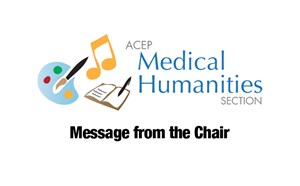
From the Chair
Seth C. Hawkins MD, FACEP
We’ve all heard—in ways that are alternately flattering, embarrassing, and outright inappropriate—the characterization of health care professionals, and especially emergency personnel, as “heroes”, or even “superheroes.”
Stuart Harris, an associate professor of emergency medicine at Harvard University, has taken that assertion at face value and put a spin on it that might be interesting to those of us in the Medical Humanities Section.
At the 2021 Wilderness Medical Society Winter Conference, he asserted that “medicine’s superpower is telling stories.” He notes that “every day, healthcare workers communicate complex scientific data to patients in ways that they can understand so that patients are motivated to improve their health.” In other venues, he has asserted that “the patient history is the diagnostic engine of medicine.”
Modern medicine may be moving us away from actually listening to patients. Harris’s practice reminds us that story listening and storytelling—despite receiving little to no formal attention in medical training—is fundamental to our practice of medicine. “Their history, their labs, their tests, their vitals—they all fit together to give us an answer. It’s all telling a story, making the story fit together.” Emergency physicians are tasked with meeting multiple people every hour, usually for the first time, hearing their story, and then packaging their story (the history of present illness) into our story (the medical decision-making and diagnosis) in an exceptionally short time. Within an hour or two we have synthesized various numerical, affective, and historical data to build a story that satisfies us, and then we share that with the patient.
In a substantial number of cases, we must also build a parallel story to share with other decision makers: consultants whose belief in our story must be enrolled. We then turn to rhetoric. We take our written and mental stories and “pitch” them to the surgeon who must agree to take the patient to the operating room based on our story, or the skeptical hospitalist who must admit the patient based on our chosen narrative.
Astute observation, active listening to other stories, synthesizing our own aggregate story, and then delivering that story to others—both in writing and speech—is done every hour of every shift we are working as emergency physicians. And I would argue these are skills that are core to the humanities.
My goal in this tenure as Chair of the Medical Humanities Section has been to remind ourselves of the real-world clinical relevance of our subspecialty. Too often, medical humanities are relegated to an esoteric topic that is a hobby and has little relevance to clinical care.
Dr. Harris has reminded me once again that, in fact, the practice of medicine in the modern era is in fact an applied practice of medical humanities. Everywhere, all the time, in every patient. The sooner we convince our peers of this particular story and pay attention to this critical training and practice element, the more our patients will benefit from the tangible and immediately clinical power—perhaps even superpower—that medical humanities can bring to bedside medical care.




